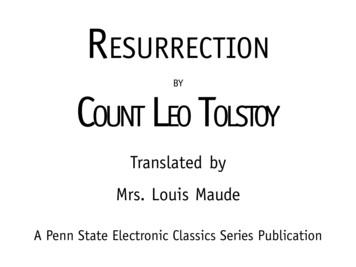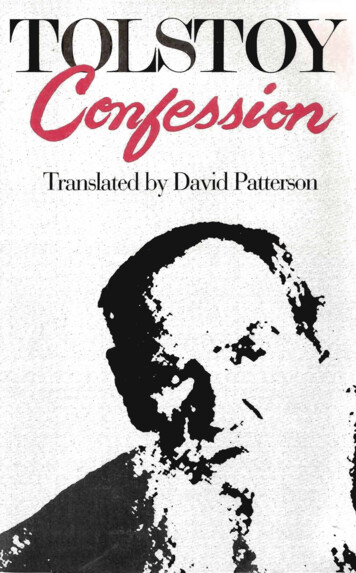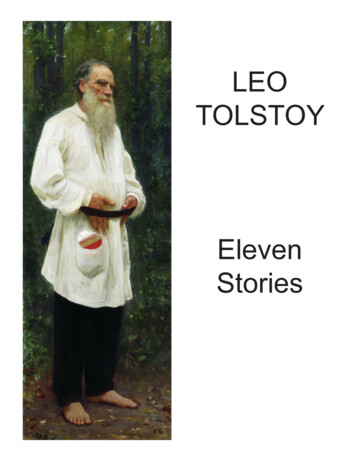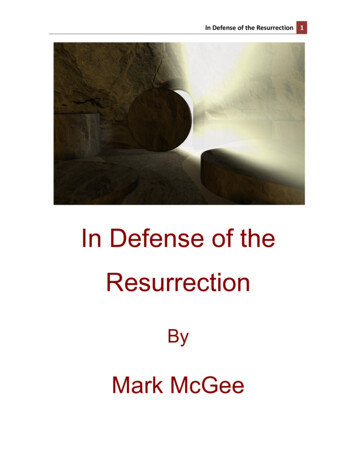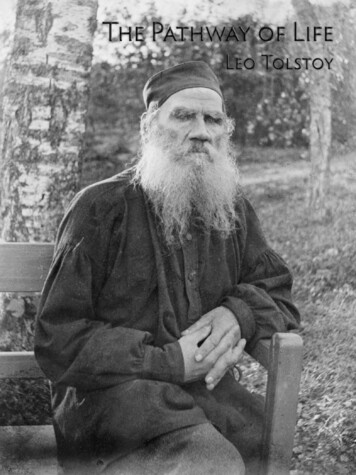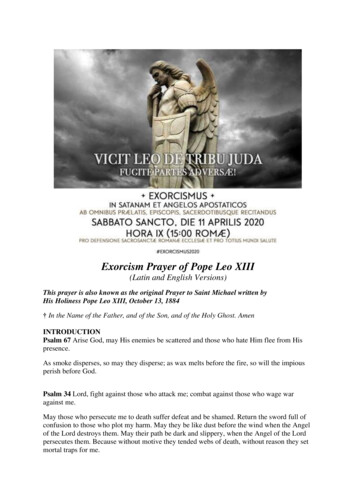
Transcription
ResurrectionByLeo Tolstoy1
TRANSLATOR'S PREFACEOpinions about Tolstoy and his work differ, but on one pointthere surely might be unanimity. A writer of world-widereputation should be at least allowed to know how to spell hisown name. Why should any one insist on spelling it "Tolstoi"(with one, two or three dots over the "i"), when he himselfwrites it "Tolstoy"? The only reason I have ever heard suggestedis, that in England and America such outlandish views areattributed to him, that an outlandish spelling is desirable tomatch those views.This novel, written in the rough by Tolstoy some years ago andfounded upon an actual occurrence, was completely rewritten byhim during the last year and a half, and all the proceeds havebeen devoted by him to aiding the Doukhobors, a sect who werepersecuted in the Caucasus (especially from 1895 to 1898) forrefusing to learn war. About seven thousand three hundred of themare settled in Canada, and about a hundred of the leaders areexiled to the remote parts of Siberia.Anything I may receive for my work in translating the book willgo to the same cause. "Prevention is better than cure," and Iwould rather help people to abstain from killing and woundingeach other than devote the money to patch up their wounds afterthe battle.2
LOUISE MAUDERESURRECTIONCHAPTER I.MASLOVA IN PRISON.Though hundreds of thousands had done their very best todisfigure the small piece of land on which they were crowdedtogether, by paving the ground with stones, scraping away everyvestige of vegetation, cutting down the trees, turning away birdsand beasts, and filling the air with the smoke of naphtha andcoal, still spring was spring, even in the town.The sun shone warm, the air was balmy; everywhere, where it didnot get scraped away, the grass revived and sprang up between thepaving-stones as well as on the narrow strips of lawn on theboulevards. The birches, the poplars, and the wild cherryunfolded their gummy and fragrant leaves, the limes were3
expanding their opening buds; crows, sparrows, and pigeons,filled with the joy of spring, were getting their nests ready;the flies were buzzing along the walls, warmed by the sunshine.All were glad, the plants, the birds, the insects, and thechildren. But men, grown-up men and women, did not leave offcheating and tormenting themselves and each other. It was notthis spring morning men thought sacred and worthy ofconsideration not the beauty of God's world, given for a joy toall creatures, this beauty which inclines the heart to peace, toharmony, and to love, but only their own devices for enslavingone another.Thus, in the prison office of the Government town, it was not thefact that men and animals had received the grace and gladness ofspring that was considered sacred and important, but that anotice, numbered and with a superscription, had come the daybefore, ordering that on this 28th day of April, at 9 a.m., threeprisoners at present detained in the prison, a man and two women(one of these women, as the chief criminal, to be conductedseparately), had to appear at Court. So now, on the 28th ofApril, at 8 o'clock, a jailer and soon after him a woman warderwith curly grey hair, dressed in a jacket with sleeves trimmedwith gold, with a blue-edged belt round her waist, and having alook of suffering on her face, came into the corridor."You want Maslova?" she asked, coming up to the cell with the4
jailer who was on duty.The jailer, rattling the iron padlock, opened the door of thecell, from which there came a whiff of air fouler even than thatin the corridor, and called out, "Maslova! to the Court," andclosed the door again.Even into the prison yard the breeze had brought the freshvivifying air from the fields. But in the corridor the air wasladen with the germs of typhoid, the smell of sewage,putrefaction, and tar; every newcomer felt sad and dejected init. The woman warder felt this, though she was used to bad air.She had just come in from outside, and entering the corridor, sheat once became sleepy.From inside the cell came the sound of bustle and women's voices,and the patter of bare feet on the floor."Now, then, hurry up, Maslova, I say!" called out the jailer, andin a minute or two a small young woman with a very full bust camebriskly out of the door and went up to the jailer. She had on agrey cloak over a white jacket and petticoat. On her feet shewore linen stockings and prison shoes, and round her head wastied a white kerchief, from under which a few locks of black hairwere brushed over the forehead with evident intent. The face ofthe woman was of that whiteness peculiar to people who have lived5
long in confinement, and which puts one in mind of shoots ofpotatoes that spring up in a cellar. Her small broad hands andfull neck, which showed from under the broad collar of her cloak,were of the same hue. Her black, sparkling eyes, one with aslight squint, appeared in striking contrast to the dull pallorof her face.She carried herself very straight, expanding her full bosom.With her head slightly thrown back, she stood in the corridor,looking straight into the eyes of the jailer, ready to complywith any order.The jailer was about to lock the door when a wrinkled andsevere-looking old woman put out her grey head and began speakingto Maslova. But the jailer closed the door, pushing the oldwoman's head with it. A woman's laughter was heard from the cell,and Maslova smiled, turning to the little grated opening in thecell door. The old woman pressed her face to the grating from theother side, and said, in a hoarse voice:"Now mind, and when they begin questioning you, just repeat overthe same thing, and stick to it; tell nothing that is notwanted.""Well, it could not be worse than it is now, anyhow; I only wish6
it was settled one way or another.""Of course, it will be settled one way or another," said thejailer, with a superior's self-assured witticism. "Now, then, getalong! Take your places!"The old woman's eyes vanished from the grating, and Maslovastepped out into the middle of the corridor. The warder in front,they descended the stone stairs, past the still fouler, noisycells of the men's ward, where they were followed by eyes lookingout of every one of the gratings in the doors, and entered theoffice, where two soldiers were waiting to escort her. A clerkwho was sitting there gave one of the soldiers a paper reeking oftobacco, and pointing to the prisoner, remarked, "Take her."The soldier, a peasant from Nijni Novgorod, with a red,pock-marked face, put the paper into the sleeve of his coat,winked to his companion, a broad-shouldered Tchouvash, and thenthe prisoner and the soldiers went to the front entrance, out ofthe prison yard, and through the town up the middle of theroughly-paved street.Isvostchiks [cabmen], tradespeople, cooks, workmen,and government clerks, stopped and looked curiously at theprisoner; some shook their heads and thought, "This is what evilconduct, conduct unlike ours, leads to." The children stopped and7
gazed at the robber with frightened looks; but the thought thatthe soldiers were preventing her from doing more harm quietedtheir fears. A peasant, who had sold his charcoal, and had hadsome tea in the town, came up, and, after crossing himself, gaveher a copeck. The prisoner blushed and muttered something; shenoticed that she was attracting everybody's attention, and thatpleased her. The comparatively fresh air also gladdened her, butit was painful to step on the rough stones with the ill-madeprison shoes on her feet, which had become unused to walking.Passing by a corn-dealer's shop, in front of which a few pigeonswere strutting about, unmolested by any one, the prisoner almosttouched a grey-blue bird with her foot; it fluttered up and flewclose to her ear, fanning her with its wings. She smiled, thensighed deeply as she remembered her present position.8
CHAPTER II.MASLOVA'S EARLY LIFE.The story of the prisoner Maslova's life was a very common one.Maslova's mother was the unmarried daughter of a village woman,employed on a dairy farm, which belonged to two maiden ladies whowere landowners. This unmarried woman had a baby every year, and,as often happens among the village people, each one of theseundesired babies, after it had been carefully baptised, wasneglected by its mother, whom it hindered at her work, and leftto starve. Five children had died in this way. They had all beenbaptised and then not sufficiently fed, and just left to die.The sixth baby, whose father was a gipsy tramp, would have sharedthe same fate, had it not so happened that one of the maidenladies came into the farmyard to scold the dairymaids for sendingup cream that smelt of the cow. The young woman was lying in thecowshed with a fine, healthy, new-born baby. The old maiden ladyscolded the maids again for allowing the woman (who had just beenconfined) to lie in the cowshed, and was about to go away, butseeing the baby her heart was touched, and she offered to standgodmother to the little girl, and pity for her littlegod-daughter induced her to give milk and a little money to themother, so that she should feed the baby; and the little girllived. The old ladies spoke of her as "the saved one." When the9
child was three years old, her mother fell ill and died, and themaiden ladies took the child from her old grandmother, to whomshe was nothing but a burden.The little black-eyed maiden grew to be extremely pretty, and sofull of spirits that the ladies found her very entertaining.The younger of the ladies, Sophia Ivanovna, who had stoodgodmother to the girl, had the kinder heart of the two sisters;Maria Ivanovna, the elder, was rather hard. Sophia Ivanovnadressed the little girl in nice clothes, and taught her to readand write, meaning to educate her like a lady. Maria Ivanovnathought the child should be brought up to work, and trained herto be a good servant. She was exacting; she punished, and, whenin a bad temper, even struck the little girl. Growing up underthese two different influences, the girl turned out half servant,half young lady. They called her Katusha, which sounds lessrefined than Katinka, but is not quite so common as Katka. Sheused to sew, tidy up the rooms, polish the metal cases of theicons and do other light work, and sometimes she sat and read tothe ladies.Though she had more than one offer, she would not marry. She feltthat life as the wife of any of the working men who were courtingher would be too hard; spoilt as she was by a life of case.10
She lived in this manner till she was sixteen, when the nephew ofthe old ladies, a rich young prince, and a university student,came to stay with his aunts, and Katusha, not daring toacknowledge it even to herself, fell in love with him.Then two years later this same nephew stayed four days with hisaunts before proceeding to join his regiment, and the nightbefore he left he betrayed Katusha, and, after giving her a100-rouble note, went away. Five months later she knew forcertain that she was to be a mother. After that everything seemedrepugnant to her, her only thought being how to escape from theshame that awaited her. She began not only to serve the ladies ina half-hearted and negligent way, but once, without knowing howit happened, was very rude to them, and gave them notice, a thingshe repented of later, and the ladies let her go, noticingsomething wrong and very dissatisfied with her. Then she got ahousemaid's place in a police-officer's house, but stayed thereonly three months, for the police officer, a man of fifty, beganto torment her, and once, when he was in a specially enterprisingmood, she fired up, called him "a fool and old devil," and gavehim such a knock in the chest that he fell. She was turned outfor her rudeness. It was useless to look for another situation,for the time of her confinement was drawing near, so she went tothe house of a village midwife, who also sold wine. Theconfinement was easy; but the midwife, who had a case of fever inthe village, infected Katusha, and her baby boy had to be sent to11
the foundlings' hospital, where, according to the words of theold woman who took him there, he at once died. When Katusha wentto the midwife she had 127 roubles in all, 27 which she hadearned and 100 given her by her betrayer. When she left she hadbut six roubles; she did not know how to keep money, but spent iton herself, and gave to all who asked. The midwife took 40roubles for two months' board and attendance, 25 went to get thebaby into the foundlings' hospital, and 40 the midwife borrowedto buy a cow with. Twenty roubles went just for clothes anddainties. Having nothing left to live on, Katusha had to look outfor a place again, and found one in the house of a forester. Theforester was a married man, but he, too, began to annoy her fromthe first day. He disgusted her, and she tried to avoid him. Buthe, more experienced and cunning, besides being her master, whocould send her wherever he liked, managed to accomplish hisobject. His wife found it out, and, catching Katusha and herhusband in a room all by themselves, began beating her. Katushadefended herself, and they had a fight, and Katusha got turnedout of the house without being paid her wages.Then Katusha went to live with her aunt in town. The aunt'shusband, a bookbinder, had once been comfortably off, but hadlost all his customers, and had taken to drink, and spent all hecould lay hands on at the public-house. The aunt kept a littlelaundry, and managed to support herself, her children, and herwretched husband. She offered Katusha the place of an assistant12
laundress; but seeing what a life of misery and hardship heraunt's assistants led, Katusha hesitated, and applied to aregistry office for a place. One was found for her with a ladywho lived with her two sons, pupils at a public day school. Aweek after Katusha had entered the house the elder, a big fellowwith moustaches, threw up his studies and made love to her,continually following her about. His mother laid all the blame onKatusha, and gave her notice.It so happened that, after many fruitless attempts to find asituation, Katusha again went to the registry office, and theremet a woman with bracelets on her bare, plump arms and rings onmost of her fingers. Hearing that Katusha was badly in want of aplace, the woman gave her her address, and invited her to come toher house. Katusha went. The woman received her very kindly, setcake and sweet wine before her, then wrote a note and gave it toa servant to take to somebody. In the evening a tall man, withlong, grey hair and a white beard, entered the room, and sat downat once near Katusha, smiling and gazing at her with glisteningeyes. He began joking with her. The hostess called him away intothe next room, and Katusha heard her say, "A fresh one from thecountry," Then the hostess called Katusha aside and told her thatthe man was an author, and that he had a great deal of money, andthat if he liked her he would not grudge her anything. He didlike her, and gave her 25 roubles, promising to see her often.The 25 roubles soon went; some she paid to her aunt for board and13
lodging; the rest was spent on a hat, ribbons, and such like. Afew days later the author sent for her, and she went. He gave heranother 25 roubles, and offered her a separate lodging.Next door to the lodging rented for her by the author there liveda jolly young shopman, with whom Katusha soon fell in love. Shetold the author, and moved to a little lodging of her own. Theshopman, who promised to marry her, went to Nijni on businesswithout mentioning it to her, having evidently thrown her up, andKatusha remained alone. She meant to continue living in thelodging by herself, but was informed by the police that in thiscase she would have to get a license. She returned to her aunt.Seeing her fine dress, her hat, and mantle, her aunt no longeroffered her laundry work. As she understood things, her niece hadrisen above that sort of thing. The question as to whether shewas to become a laundress or not did not occur to Katusha,either. She looked with pity at the thin, hard-workedlaundresses, some already in consumption, who stood washing orironing with their thin arms in the fearfully hot front room,which was always full of soapy steam and draughts from thewindows, and thought with horror that she might have shared thesame fate.Katusha had begun to smoke some time before, and since the youngshopman had thrown her up she was getting more and more into thehabit of drinking. It was not so much the flavour of wine that14
tempted her as the fact that it gave her a chance of forgettingthe misery she suffered, making her feel more unrestrained andmore confident of her own worth, which she was not when quitesober; without wine she felt sad and ashamed. Just at this time awoman came along who offered to place her in one of the largestestablishments in the city, explaining all the advantages andbenefits of the situation. Katusha had the choice before her ofeither going into service or accepting this offer--and she chosethe latter. Besides, it seemed to her as though, in this way, shecould revenge herself on her betrayer and the shopman and allthose who had injured her. One of the things that tempted her,and was the cause of her decision, was the woman telling her shemight order her own dresses--velvet, silk, satin, low-necked balldresses, anything she liked. A mental picture of herself in abright yellow silk trimmed with black velvet with low neck andshort sleeves conquered her, and she gave up her passport. On thesame evening the procuress took an isvostchik and drove her tothe notorious house kept by Carolina Albertovna Kitaeva.From that day a life of chronic sin against human and divine lawscommenced for Katusha Maslova, a life which is led by hundreds ofthousands of women, and which is not merely tolerated butsanctioned by the Government, anxious for the welfare of itssubjects; a life which for nine women out of ten ends in painfuldisease, premature decrepitude, and death.15
Katusha Maslova lived this life for seven years. During theseyears she twice changed houses, and had once been to thehospital. In the seventh year of this life, when she wastwenty-six years old, happened that for which she was put inprison and for which she was now being taken to be tried, aftermore than three months of confinement with thieves and murderersin the stifling air of a prison.16
CHAPTER III.NEKHLUDOFF.When Maslova, wearied out by the long walk, reached the building,accompanied by two soldiers, Prince Dmitri Ivanovitch Nekhludoff,who had seduced her, was still lying on his high bedstead, with afeather bed on the top of the spring mattress, in a fine, clean,well-ironed linen night shirt, smoking a cigarette, andconsidering what he had to do to-day, and what had happenedyesterday.Recalling the evening he had spent with the Korchagins, a wealthyand aristocratic family, whose daughter every one expected hewould marry, he sighed, and, throwing away the end of hiscigarette, was going to take another out of the silver case; but,changing his mind, he resolutely raised his solid frame, and,putting down his smooth, white legs, stepped into his slippers,threw his silk dressing gown over his broad shoulders, and passedinto his dressing-room, walking heavily and quickly. There hecarefully cleaned his teeth, many of which were filled, withtooth powder, and rinsed his mouth with scented elixir. Afterthat he washed his hands with perfumed soap, cleaned his longnails with particular care, then, from a tap fixed to his marblewashstand, he let a spray of cold water run over his face andstout neck. Having finished this part of the business, he went17
into a third room, where a shower bath stood ready for him.Having refreshed his full, white, muscular body, and dried itwith a rough bath sheet, he put on his fine undergarments and hisboots, and sat down before the glass to brush his black beard andhis curly hair, that had begun to get thin above the forehead.Everything he used, everything belonging to his toilet, hislinen, his clothes, boots, necktie, pin, studs, was of the bestquality, very quiet, simple, durable and costly.Nekhludoff dressed leisurely, and went into the dining-room. Atable, which looked very imposing with its four legs carved inthe shape of lions' paws, and a huge side-board to match, stoodin the oblong room, the floor of which had been polished by threemen the day before. On the table, which was covered with a fine,starched cloth, stood a silver coffeepot full of aromatic coffee,a sugar basin, a jug of fresh cream, and a bread basket filledwith fresh rolls, rusks, and biscuits; and beside the plate laythe last number of the Revue des Deux Mondes, a newspaper, andseveral letters.Nekhludoff was just going to open his letters, when a stout,middle-aged woman in mourning, a lace cap covering the wideningparting of her hair, glided into the room. This was AgraphenaPetrovna, formerly lady's maid to Nekhludoff's mother. Hermistress had died quite recently in this very house, and sheremained with the son as his housekeeper. Agraphena Petrovna had18
spent nearly ten years, at different times, abroad withNekhludoff's mother, and had the appearance and manners of alady. She had lived with the Nekhludoffs from the time she was achild, and had known Dmitri Ivanovitch at the time when he wasstill little Mitinka."Good-morning, Dmitri Ivanovitch.""Good-morning, Agraphena Petrovna. What is it you want?"Nekhludoff asked."A letter from the princess; either from the mother or thedaughter. The maid brought it some time ago, and is waiting in myroom," answered Agraphena Petrovna, handing him the letter with asignificant smile."All right! Directly!" said Nekhludoff, taking the letter andfrowning as he noticed Agraphena Petrovna's smile.That smile meant that the letter was from the younger PrincessKorchagin, whom Agraphena Petrovna expected him to marry. Thissupposition of hers annoyed Nekhludoff."Then I'll tell her to wait?" and Agraphena Petrovna took a crumbbrush which was not in its place, put it away, and sailed out ofthe room.19
Nekhludoff opened the perfumed note, and began reading it.The note was written on a sheet of thick grey paper, with roughedges; the writing looked English. It said:Having assumed the task of acting as your memory, I take theliberty of reminding you that on this the 28th day of April youhave to appear at the Law Courts, as juryman, and, inconsequence, can on no account accompany us and Kolosoff to thepicture gallery, as, with your habitual flightiness, you promisedyesterday; a moins que vous ne soyez dispose a payer la courd'assise les 300 roubles d'amende que vous vous refusez pourvotre cheval, for not appearing in time. I remembered it lastnight after you were gone, so do not forget.Princess M. Korchagin.On the other side was a postscript.Maman vous fait dire que votre convert vous attendra jusqu'ala nuit. Venez absolument a quelle heure que cela soit.M. K.Nekhludoff made a grimace. This note was a continuation of that20
skilful manoeuvring which the Princess Korchagin had alreadypractised for two months in order to bind him closer and closerwith invisible threads. And yet, beside the usual hesitation ofmen past their youth to marry unless they are very much in love,Nekhludoff had very good reasons why, even if he did make up hismind to it, he could not propose at once. It was not that tenyears previously he had betrayed and forsaken Maslova; he hadquite forgotten that, and he would not have considered it areason for not marrying. No! The reason was that he had a liaisonwith a married woman, and, though he considered it broken off,she did not.Nekhludoff was rather shy with women, and his very shynessawakened in this married woman, the unprincipled wife of themarechal de noblesse of a district where Nekhludoff was presentat an election, the desire of vanquishing him. This woman drewhim into an intimacy which entangled him more and more, while itdaily became more distasteful to him. Having succumbed to thetemptation, Nekhludoff felt guilty, and had not the courage tobreak the tie without her consent. And this was the reason he didnot feel at liberty to propose to Korchagin even if he had wishedto do so. Among the letters on the table was one from thiswoman's husband. Seeing his writing and the postmark, Nekhludoffflushed, and felt his energies awakening, as they always did whenhe was facing any kind of danger.21
But his excitement passed at once. The marechal do noblesse, ofthe district in which his largest estate lay, wrote only to letNekhludoff know that there was to be a special meeting towardsthe end of May, and that Nekhludoff was to be sure and come to"donner un coup d'epaule," at the important debates concerningthe schools and the roads, as a strong opposition by thereactionary party was expected.The marechal was a liberal, and was quite engrossed in thisfight, not even noticing the misfortune that had befallen him.Nekhludoff remembered the dreadful moments he had lived through;once when he thought that the husband had found him out and wasgoing to challenge him, and he was making up his mind to fireinto the air; also the terrible scene he had with her when sheran out into the park, and in her excitement tried to drownherself in the pond."Well, I cannot go now, and can do nothing until I get a replyfrom her," thought Nekhludoff. A week ago he had written her adecisive letter, in which he acknowledged his guilt, and hisreadiness to atone for it; but at the same time he pronouncedtheir relations to be at an end, for her own good, as heexpressed it. To this letter he had as yet received no answer.This might prove a good sign, for if she did not agree to breakoff their relations, she would have written at once, or even come22
herself, as she had done before. Nekhludoff had heard that therewas some officer who was paying her marked attention, and thistormented him by awakening jealousy, and at the same timeencouraged him with the hope of escape from the deception thatwas oppressing him.The other letter was from his steward. The steward wrote to tellhim that a visit to his estates was necessary in order to enterinto possession, and also to decide about the further managementof his lands; whether it was to continue in the same way as whenhis mother was alive, or whether, as he had represented to thelate lamented princess, and now advised the young prince, theyhad not better increase their stock and farm all the land nowrented by the peasants themselves. The steward wrote that thiswould be a far more profitable way of managing the property; atthe same time, he apologised for not having forwarded the 3,000roubles income due on the 1st. This money would be sent on by thenext mail. The reason for the delay was that he could not get themoney out of the peasants, who had grown so untrustworthy that hehad to appeal to the authorities. This letter was partlydisagreeable, and partly pleasant. It was pleasant to feel thathe had power over so large a property, and yet disagreeable,because Nekhludoff had been an enthusiastic admirer of HenryGeorge and Herbert Spencer. Being himself heir to a largeproperty, he was especially struck by the position taken up bySpencer in Social Statics, that justice forbids private23
landholding, and with the straightforward resoluteness of hisage, had not merely spoken to prove that land could not be lookedupon as private property, and written essays on that subject atthe university, but had acted up to his convictions, and,considering it wrong to hold landed property, had given the smallpiece of land he had inherited from his father to the peasants.Inheriting his mother's large estates, and thus becoming a landedproprietor, he had to choose one of two things: either to give uphis property, as he had given up his father's land ten yearsbefore, or silently to confess that all his former ideas weremistaken and false.He could not choose the former because he had no means but thelanded estates (he did not care to serve); moreover, he hadformed luxurious habits which he could not easily give up.Besides, he had no longer the same inducements; his strongconvictions, the resoluteness of youth, and the ambitious desireto do something unusual were gone. As to the second course, thatof denying those clear and unanswerable proofs of the injusticeof landholding, which he had drawn from Spencer's Social Statics,and the brilliant corroboration of which he had at a later periodfound in the works of Henry George, such a course was impossibleto him.24
CHAPTER IV.MISSY.When Nekhludoff had finished his coffee, he went to his study tolook at the summons, and find out what time he was to appear atthe court, before writing his answer to the princess. Passingthrough his studio, where a few studies hung on the walls and,facing the easel, stood an unfinished picture, a feeling ofinability to advance in art, a sense of his incapacity, came overhim. He had often had this feeling, of late, and explained it byhis too finely-developed aesthetic taste; still, the feeling wasa very unpleasant one. Seven years before this he had given upmilitary service, feeling sure that he had a talent for art, andhad looked down with some disdain at all other activity from theheight of his artistic standpoint. And now it turned out that hehad no right to do so, and therefore everything that reminded himof all this was unpleasant. He looked at the luxurious fittingsof the studio with a heavy heart, and it was in no cheerful moodthat he entered his study, a large, lofty room fitted up with aview to comfort, convenience, and elegant appearance. He foundthe summons at once in a pigeon hole, labelled "immediate," ofhis large writing table. He had to appear at the court at 11o'clock.Nekhludoff sat down to write a note in reply
Leo Tolstoy . 2 TRANSLATOR'S PREFACE Opinions about Tolstoy and his work differ, but on one point there surely might be unanimity. A writer of world-wide . This novel, written in the rough by Tolstoy some years ago and founded upon an actual occurrence, was completely rewritten by him durin



